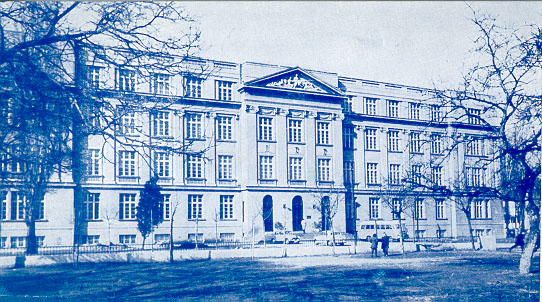Education and Research at the Faculty of Agriculture - Belgrade

Prof. dr Z. Gajic,
Vice-Dean of the Agricultural
Faculty,
University of Belgrade,
egajicz@ubbg.etf.bg.ac.yu
To The Participants of the Virtual Electronic Educational Workshop
Faculties activities
- Teaching and research underpin agriculture,s dynamic development,
- Promotion of Yugoslav agriculture, one of the strong points of the economy.
From the very beginning 43 subjects were taught divided into three groups: general, vocational and subsidiary.
In 1970 the Faculty of Agriculture was reorganized. At present, the Faculty is organized into eight teaching departments and research institutes.
Teaching departments:
Plant ProductionResearch Institutes:Fruit and ViticultureAnimal ProductionPlant ProtectionAgricultural MechanizationMeliorationFood Technology, andAgro-economics
Plant SciencesUndergraduate studiesFruit and Viticulture SciencesAnimal SciencesPlant Protection SciencesAgricultural Mechanization SciencesSoil Science and MeliorationFood Technology SciencesAgro-economics and Management
Students must ordinarily
spend at least four years in the Faculty to qualify to graduation.
Nine types of course
lead to the degree of
Diploma:
Agricultural engineer for plant production
Agricultural engineer for fruit and vituculture
Agricultural engineer for animal production
Agricultural engineer for plant protection
Agricultural engineer for mechanization
Agricultural engineer for melioration
Agricultural engineer for agro-economics
Engineer for technology of plant origin foods
Engineer for technology of animal origin foods.
Postgraduate
studies
Several types of postgraduate
courses are offered in the Fasculty of Agriculture. Courses of up to
one year,s
instruction lead to the degree of Specialist, and courses covering
two years, partly of instruction and partly of independent work, lead to
the degree of Master of Science (MrSci).
Postgraduate and doctor,s
training for an MrSci and DrSci are: Learning to dicsover or revise
scientific truths.
Research
Besides the snccessful education, the Faculty has made a significant contribution to the
- Development of agricultural science
- Advancement of productrion, and
- Processing of agricultural products during past 80-years.
- Professors and assistants 293
- Technical staff 214
- Total 507
- Undergraduates 3410
- Postgraduates 1053
The academic affairs ot he Faculty are goverend by the Dean of the Faculty and Administrative Board. Dean is chosen among the Professors and serves for a two-year term. He is assisted by a Vice-Deans who deal among other things, with the organisation of undergraduate and postgraduate studies, research, and many day-to-day administrative matters.
